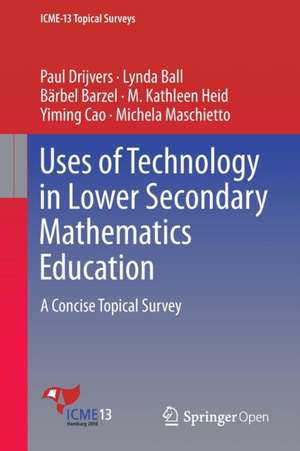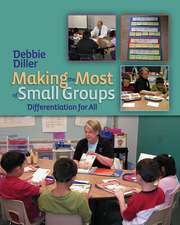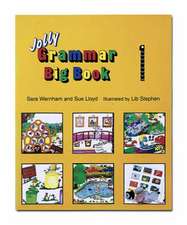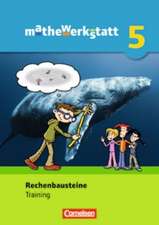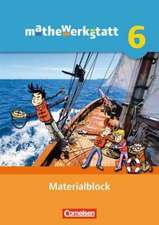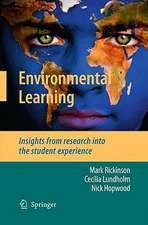Uses of Technology in Lower Secondary Mathematics Education: A Concise Topical Survey: ICME-13 Topical Surveys
Autor Paul Drijvers, Lynda Ball, Bärbel Barzel, M. Kathleen Heid, Yiming Cao, Michela Maschiettoen Limba Engleză Paperback – 29 iun 2016
The survey’s final section offers suggestions for future trends in technology-rich mathematics education and provides a research agenda reflecting those trends. Predicting what lower secondary mathematics education might look like in 2025 with respect to the role of digital tools in curricula, teaching and learning, it examines the question of how teachers can integrate physical and virtual experiences to promote a deeper understanding of mathematics.
The issues and findings presented here provide an overview of current research and offer a glimpse into a potential future characterized by the effective integration of technology to support mathematics teaching and learning at the lower secondary level.
Din seria ICME-13 Topical Surveys
-
 Preț: 136.40 lei
Preț: 136.40 lei -
 Preț: 136.40 lei
Preț: 136.40 lei -
 Preț: 136.40 lei
Preț: 136.40 lei -
 Preț: 136.02 lei
Preț: 136.02 lei -
 Preț: 136.40 lei
Preț: 136.40 lei -
 Preț: 136.40 lei
Preț: 136.40 lei -
 Preț: 136.40 lei
Preț: 136.40 lei -
 Preț: 136.24 lei
Preț: 136.24 lei -
 Preț: 136.24 lei
Preț: 136.24 lei -
 Preț: 136.24 lei
Preț: 136.24 lei -
 Preț: 136.40 lei
Preț: 136.40 lei -
 Preț: 136.24 lei
Preț: 136.24 lei -
 Preț: 136.02 lei
Preț: 136.02 lei -
 Preț: 136.02 lei
Preț: 136.02 lei -
 Preț: 136.40 lei
Preț: 136.40 lei -
 Preț: 135.47 lei
Preț: 135.47 lei -
 Preț: 136.02 lei
Preț: 136.02 lei -
 Preț: 135.85 lei
Preț: 135.85 lei -
 Preț: 137.38 lei
Preț: 137.38 lei -
 Preț: 136.02 lei
Preț: 136.02 lei -
 Preț: 136.77 lei
Preț: 136.77 lei -
 Preț: 136.99 lei
Preț: 136.99 lei -
 Preț: 136.02 lei
Preț: 136.02 lei -
 Preț: 136.40 lei
Preț: 136.40 lei -
 Preț: 136.77 lei
Preț: 136.77 lei
Preț: 136.02 lei
Nou
Puncte Express: 204
Preț estimativ în valută:
26.03€ • 27.24$ • 21.66£
26.03€ • 27.24$ • 21.66£
Carte tipărită la comandă
Livrare economică 31 martie-14 aprilie
Preluare comenzi: 021 569.72.76
Specificații
ISBN-13: 9783319336657
ISBN-10: 3319336657
Pagini: 34
Ilustrații: VII, 34 p. 9 illus.
Dimensiuni: 155 x 235 x 2 mm
Greutate: 0.08 kg
Ediția:1st ed. 2016
Editura: Springer International Publishing
Colecția Springer
Seria ICME-13 Topical Surveys
Locul publicării:Cham, Switzerland
ISBN-10: 3319336657
Pagini: 34
Ilustrații: VII, 34 p. 9 illus.
Dimensiuni: 155 x 235 x 2 mm
Greutate: 0.08 kg
Ediția:1st ed. 2016
Editura: Springer International Publishing
Colecția Springer
Seria ICME-13 Topical Surveys
Locul publicării:Cham, Switzerland
Cuprins
Main Topics You Can Find in this “ICME-13 Topical Survey”.- Introduction.- Survey on the State-of-the-art.- Summary and Looking Ahead.
Recenzii
“Uses of Technology in Lower Secondary Mathematics Education … focuses on the recent uses of technology in mathematics education from an international point-of-view through practice-oriented experiences and research based evidence. … offers to the reader suggestions for future work in technology-rich mathematics education and considers a research agenda reflecting those trends. Further, the survey gives predictions on what lower secondary mathematics education may look like in 2025 with respect to the role of digital tools in curricula, teaching, and learning.” (Peter T. Olszewski, MAA Reviews, maa.org, March, 2017)
Textul de pe ultima copertă
This topical survey provides an overview of the current state of the art in technology use in mathematics education, including both practice-oriented experiences and research-based evidence, as seen from an international perspective. Three core themes are discussed: Evidence of effectiveness; Digital assessment; and Communication and collaboration.
The survey’s final section offers suggestions for future trends in technology-rich mathematics education and provides a research agenda reflecting those trends. Predicting what lower secondary mathematics education might look like in 2025 with respect to the role of digital tools in curricula, teaching and learning, it examines the question of how teachers can integrate physical and virtual experiences to promote a deeper understanding of mathematics.
The issues and findings presented here provide an overview of current research and offer a glimpse into a potential future characterized by the effective integration of technology to support mathematics teaching and learning at the lower secondary level.
The survey’s final section offers suggestions for future trends in technology-rich mathematics education and provides a research agenda reflecting those trends. Predicting what lower secondary mathematics education might look like in 2025 with respect to the role of digital tools in curricula, teaching and learning, it examines the question of how teachers can integrate physical and virtual experiences to promote a deeper understanding of mathematics.
The issues and findings presented here provide an overview of current research and offer a glimpse into a potential future characterized by the effective integration of technology to support mathematics teaching and learning at the lower secondary level.
Caracteristici
Provides a comprehensive survey of current research findings Highlights future directions for the use of digital technologies in lower secondary mathematics education Integrates international perspectives to provide a holistic view on worldwide developments Includes supplementary material: sn.pub/extras
